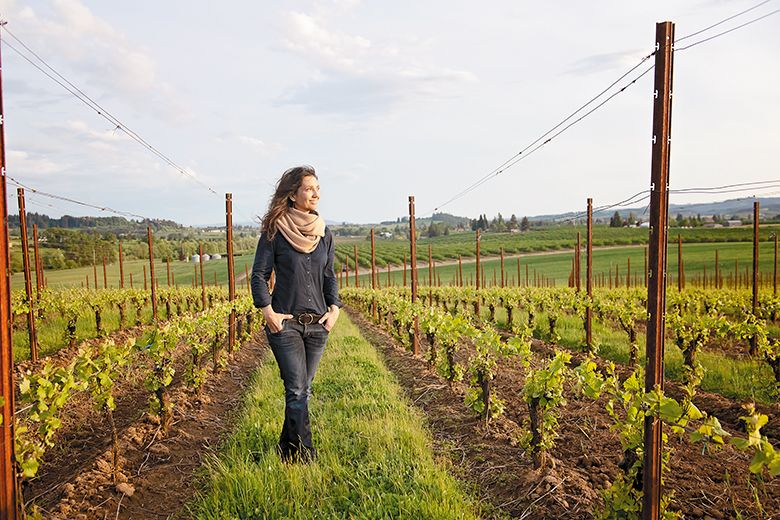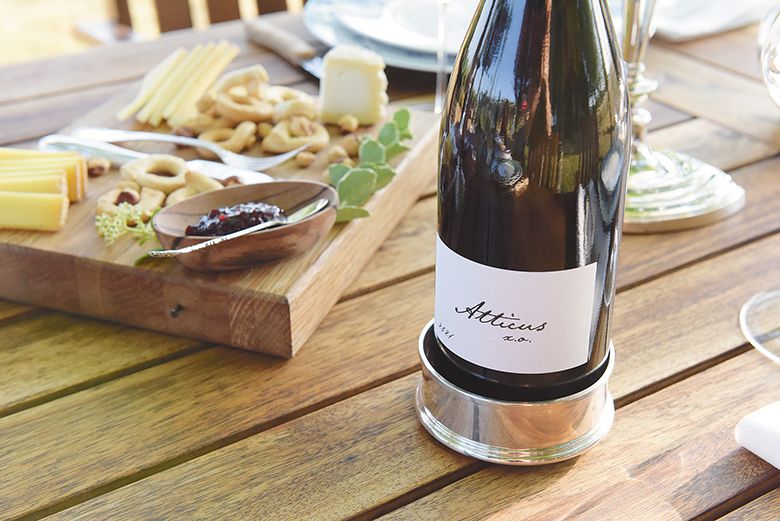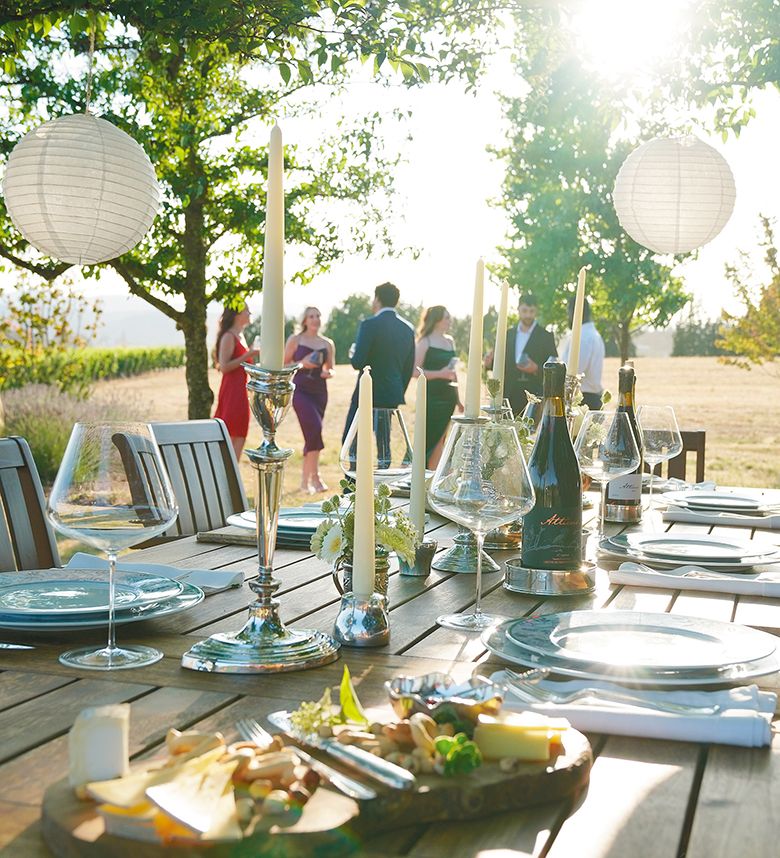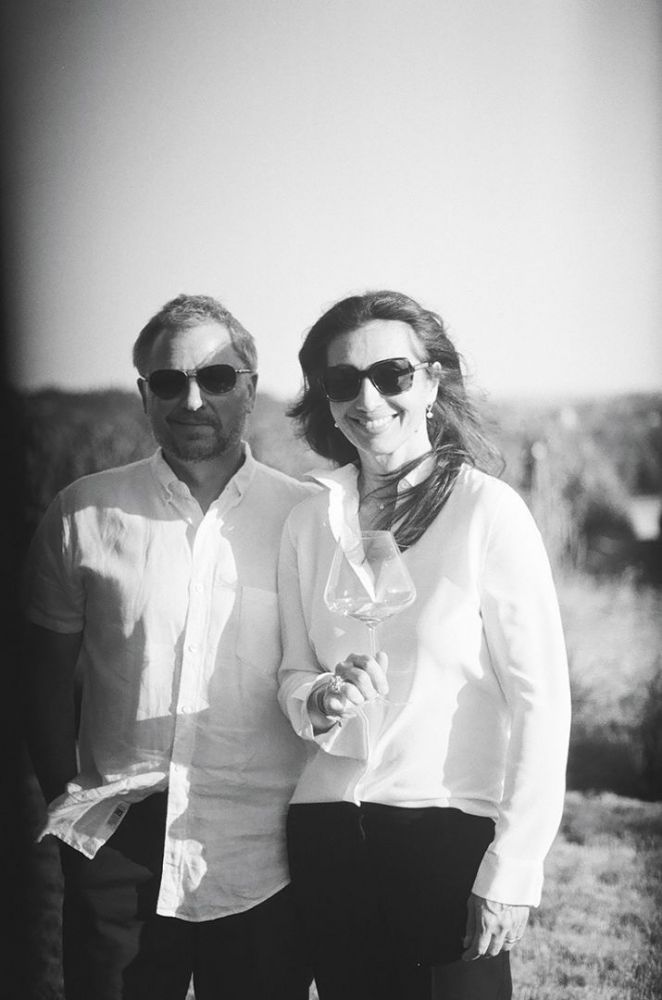On a Whim
Atticus Estate Vineyard & Winery celebrates twenty-year anniversary




By Aakanksha Agarwal
From a vacation in 2004 to the micro-boutique Atticus Estate Vineyard & Winery, rooted in Yamhill-Carlton’s marine soils, winemaker Ximena Orrego redefined success on her own terms— balancing family, heritage and community while crafting Pinot Noir that evokes intimacy and grace.
When Orrego first set foot in the Willamette Valley in October 2004, she wasn’t looking for a new life. Orrego and husband, Guy, were living in South Florida, entrenched in corporate jobs. Born in Peru, she was raised across Latin America, while he was British-French. Together, their careers seemed destined to follow the well-worn path of international postings and constant travel. “We imagined our lives would be similar to the ones we grew up with, being expats, moving from city to city,” she confessed. “Oregon was never on our radar.”
After tasting their first Oregon Pinot Noir, curiosity led the couple to book a trip to the Valley. Over several days, they toured the rolling hills of the soon-to-be-established Yamhill-Carlton American Viticultural Area, or AVA. A realtor showed them properties– each one more compelling than the last. “We just fell in love with it,” Orrego remembered. “Near the end, we thought, wouldn’t it be wonderful to have a small cottage here as a U.S. base? And then suddenly we were standing on this hill, fifty acres with no vineyard, no home, nothing… and placing a bid.”
It was an impulsive move, but also a radical one. At the time, with fewer than 170 wineries in the Willamette Valley, the region was still developing its reputation for world-class Pinot Noir. “We weren’t planning to make wine,” Orrego admitted. “But when we realized the potential here, and what it could mean for our kids to grow up connected to nature, at a slower pace, we knew this had to be our future.”
They planted their first vines in 2005, built a house two years later, and watched as the property came to life. “In your youth, you feel you can do everything, take on the world,” she recalled. “That’s how we felt then.”
Finding a Path in Oregon
Neither had winemaking experience, but the Oregon community offered open doors. Scott and Annie Shull of Raptor Ridge Winery became early mentors. “Scott told us, ‘I’ll be your winemaker. I’ll source fruit for you until your own vines are ready. You need to start building your brand now.’ That encouragement was everything.” Atticus’s first commercial wines were crafted from purchased fruit in Raptor Ridge’s cellar until the young estate vines made their debut in 2008.
Mentorship played a pivotal role in Orrego’s wine career. Later, when she wanted to add rosé, Shannon Gustafson, then a winemaker at Raptor Ridge, stepped in. “She said, ‘Why don’t you try it? I’ll show you,’” Orrego recounted. “I loved her approach, and I’ve made rosé ever since.” That rosé remains intentionally crafted, picked early for natural acidity and aged with finesse.
Growth and Intimacy
“People encouraged us to make thousands of cases, build a big winery, distribute nationally,” she shared. By 2009, Atticus Wines, approaching 1,000 annual cases and shared a tasting room in Carlton. With two small children and demanding jobs, reality hit. “We asked ourselves if this was really what we wanted?”
The answer was no. Around 2016, they bought out their partners, scaled back, and chose a micro-boutique model: fewer than 600 cases annually, all Pinot Noir. “Once it was just us; we found our sweet spot,” Orrego explained. “I wasn’t traveling for work anymore. I could be fully present: for our wine, business and our family. It felt like the life we imagined at the very beginning.”
In an industry where growth is often the measure of success, by scaling down, Atticus Wines became a case study on integrity. “It took tweaks,” Orrego admitted. “But we ended up exactly where we wanted to be: intimate, authentic and family-centered.”
Wines that Speak of Place
The Atticus Estate Vineyard, located in Yamhill-Carlton, is a sub-AVA prized for its ancient marine sediments– sandy, quick-draining, rocky soils where vines struggle. “We’ve unearthed rocks with shells still in them,” Orrego noted. That geology creates the foundation of her wines. “There’s always this savory, umami-like element, a soy or mineral note, that sits at the core. Our Pinots lean toward dark cherry and plum, texture-driven more than acid-driven.”
Her lineup reflects that philosophy. The XO Pinot Noir, named for her initials, is a barrel or two each vintage that she can’t bear to blend away. “It’s the wine that captivates me, whether through power or elegance.” The Atticus Vineyard Pinot Noir is the reserve, drawn from seven or eight barrels that best balance depth and longevity. The Yamhill-Carlton Pinot Noir is the entry point, 250–300 cases made with more neutral oak, approachable, young yet age-worthy. And then there is the small rosé, crisp and serious, which she pairs with delicate sashimi or tiraditos, a Peruvian dish of thinly sliced raw fish served in a citrusy, spicy sauce
A Woman, a Latina, a Winemaker
When asked how her identity impacts her winemaking style, Orrego paused for a moment. “Regardless of background, I want to make the best possible wine,” she declared. “But being female does influence my approach. I’m emotional, more temperamental, and I own that. Where I am at a particular time, from a mental perspective, influences my product. Pinot Noir has this ability to be so transparent… there’s the more objective, chemistry-driven aspect, yet also an artistic, emotional component that is equally important.”
Orrego’s exceptional hospitality shines when welcoming guests into her home. She hosts tastings by appointment, with no more than four each week and only one per day. “I want everyone to receive the very best of me,” she stated. “I set the table beautifully, use delicate glassware, sit with them and walk the vineyard. It feels like entertaining a friend.”
Her international background imbues those encounters. Spanish and English flow naturally. Pairings often draw from family traditions, such as a French onion tart, coq au vin, or her father’s favorite lamb seco, a Peruvian dish braised in cilantro. For Atticus Winery’s recent anniversary celebration, she partnered with Andina, Portland’s celebrated Peruvian restaurant, pairing her wines with dishes that bridged Peru and the Northwest. “It was so meaningful to share those flavors alongside our story,” she acknowledged.
Legacy in Land and People
This year, Atticus Estate Vineyard & Winery marked two decades as a commercial winery by opening magnums from 2008, crafted with all-estate fruit, alongside “the 2005 Raptor Ridge–made bottle that started it all.” Orrego also included a special limited blend from the estate’s “baby grapes,” planted in 2017, in the twentieth-anniversary offerings.
Sharing those bottles with guests felt like connecting the past to the present. “It was so special to taste what started it all,” she recalled.
Looking forward, Orrego’s vision is rooted in both family and stewardship. “My husband and I want to leave this property better than we found it,” she asserted. “I hope my children will want to take it on. I dream that my grandchildren will someday run and play in the vineyard and forest. And I want Atticus… and us, to be remembered as good members of our community and AVA.”
Atticus Estate Vineyard & Winery
20501 N.W. Russell Creek Rd., Yamhill
(503) 550-6901
Tastings by appt.
www.atticuswine.com
Aakanksha Agarwal is a wine, travel and lifestyle writer from India. Formerly a Bollywood stylist, she now resides in the U.S., embracing writing full-time while juggling family life and indulging in her passions for cuisine, literature and wanderlust.









